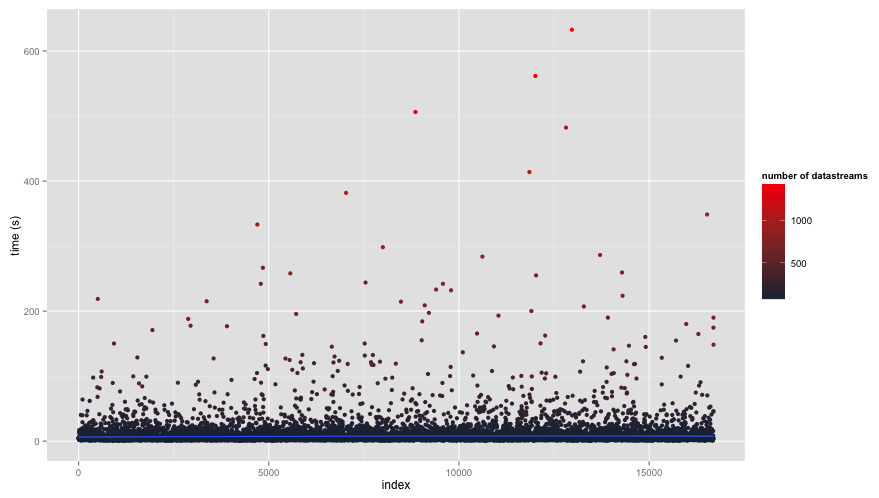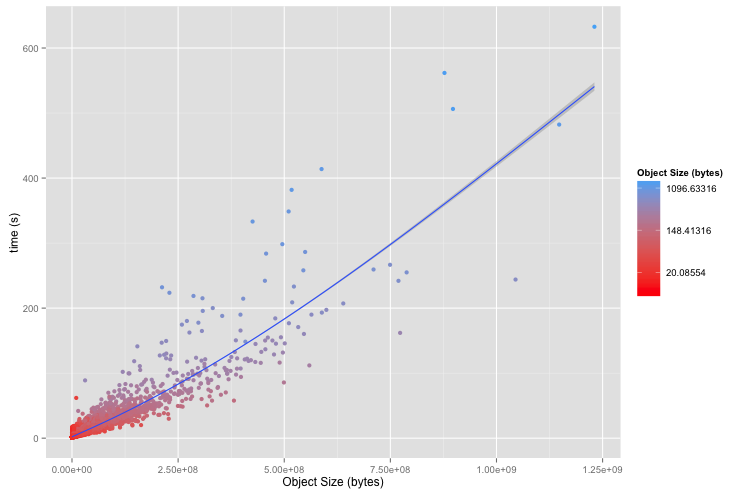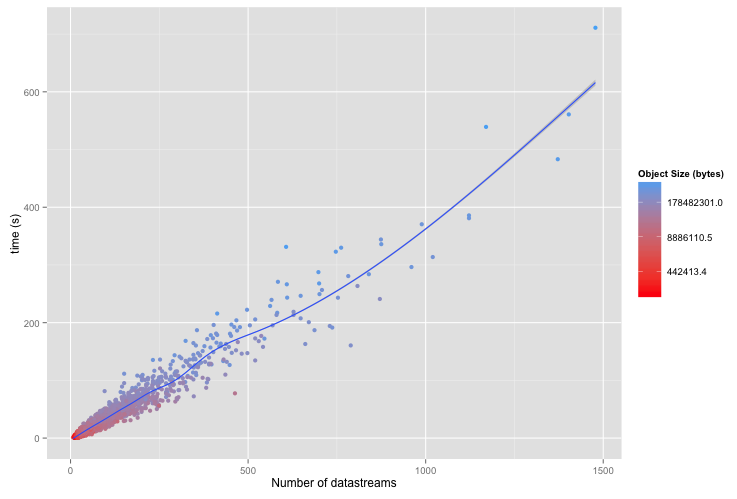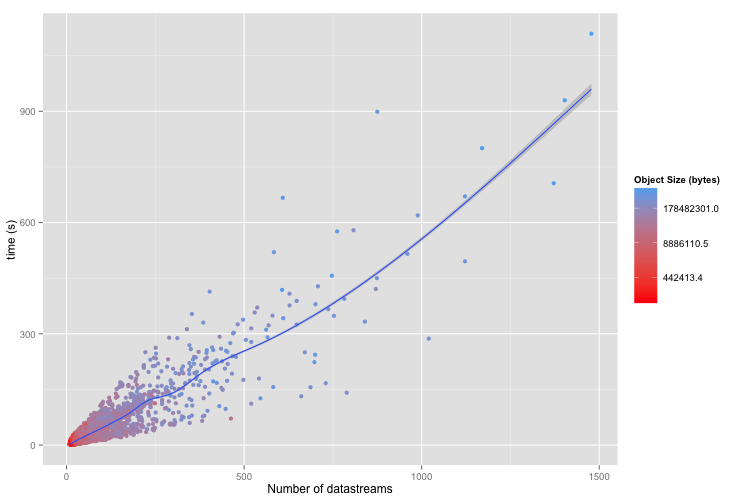Data Overview
Stanford has a collection of publications consisting of page images, metadata, and arrangement (Saltworks), containing 16712 objects/655237 items/273GB of data with the following distribution:
> quantile(file_sizes$size, c(0, .5, .7, .9, 1))
0% 50% 70% 90% 100%
0 43447 195719 1835010 288032768
> quantile(object_size$V3, c(0, .5, .7, .9, .95, .99, 1))
0% 50% 70% 90% 95% 99% 100%
51302 4680240 10743517 39806094 72375144 221829327 1230705287
> quantile(file_counts$X1, c(0, .5, .7, .9, .95, .99, 1))
0% 50% 70% 90% 95% 99% 100%
7.00 22.00 29.00 62.00 99.40 280.08 1478.00
In production, the object metadata is stored in Fedora, but the page images and other assets are stored on the file system and (somehow associated back to the object.. TBD).
Objects contain the following datastreams:
| Datastream ID | MIME Type | |
| text/xml | |
| text/xml | |
| application/xml | |
| text/xml | |
| application/rdf+xml |
On the filesystem are a variety of files (including some duplicates of data in fedora?), e.g.:
- 4.0K DC
- 20K Feigenbaum_00013946-METS.xml
- 4.0K Feigenbaum_00013946-TEXT.xml
- 4.0K RELS-EXT
- 44K bd826tf2716.pdf
- 4.0K bd826tf2716.txt
- 72K bd826tf2716_00001.jp2
- 8.0K bd826tf2716_00001.xml
- 64K bd826tf2716_00002.jp2
- 8.0K bd826tf2716_00002.xml
- 68K bd826tf2716_000BW.jp2
- 4.0K checksum
- 4.0K descMetadata
- 4.0K extracted_entities.xml
- 4.0K flipbook.json
- 4.0K flipbook.old
- 0 location
- 0 properties
- 0 stories
- 4.0K thumb.jpg
- 4.0K zotero.xml
Test 1: Simple Ingest into Fedora 3
For a first test, we're going to ingest all the data from the filesystem into a clean fcrepo3 repository, using the filename as the datastream name.
Using Fedora 3.7.1, clean install, using these properties:
database=mysql database.driver=included database.jdbcDriverClass=com.mysql.jdbc.Driver database.mysql.jdbcDriverClass=com.mysql.jdbc.Driver database.mysql.driver=included database.jdbcURL=jdbc\:mysql\://localhost/fedora?useUnicode\=true database.mysql.jdbcURL=jdbc\:mysql\://localhost/fedora?useUnicode\=true database.username=fedora database.password=redacted install.type=custom deploy.local.services=false install.tomcat=false servlet.engine=existingTomcat fedora.home=/home/lyberadmin/apps/fedora/home fedora.serverHost=sul-fedora-dev-a.stanford.edu fedora.serverContext=fedora tomcat.http.port=8080 tomcat.shutdown.port=8005 ssl.available=true tomcat.ssl.port=8443 tomcat.home=/usr/share/tomcat6 ri.enabled=true messaging.enabled=false messaging.uri= apim.ssl.required=false apia.ssl.required=false apia.auth.required=false fesl.authz.enabled=false fesl.authn.enabled=true xacml.enabled=false keystore.file=included
Tomcat is proxied through an Apache HTTPD server.
Using bash:
#!/bin/bash
base_url="http://fedoraAdmin:fedoraAdmin@localhost/fedora"
RuntimePrint()
{
duration=$(echo "scale=3;(${m2t}-${m1t})/(1*10^09)"|bc|sed 's/^\./0./')
echo -e "${objectId} ${datastreams} ${size} ${duration}\tsec"
echo -e "${objectId} ${datastreams} ${size} ${duration}" >> /data/fcrepo3-total-create-object-time
}
CreateObject() {
pid="druid:$1"
curl -X POST "$base_url/objects/$pid" &> /dev/null
cd /data-ro/assets/$1
for f in $( ls ); do
datastreams=$[$datastreams+1]
size=$[$size+`stat -c "%s" $f`]
curl -X POST --data-binary @$f "$base_url/objects/$pid/datastreams/$f?controlGroup=M" &> /dev/null
done
cd /data
}
BenchmarkObject() {
objectId=$1
if [ -d /data-ro/assets/$objectId ]; then
m1t=$(date +%s%N); m1l=$LINENO
CreateObject $objectId
m2t=$(date +%s%N); m2l=$LINENO; RuntimePrint
fi
}
export -f BenchmarkObject
export -f CreateObject
export -f RuntimePrint
export base_url
cat - | parallel -P $THREADS --env _ BenchmarkObject
Test 1a: Single-threaded ingest
> quantile(create$V4, c(0, .5, .7, .9, .95, .99, 1))
0% 50% 70% 90% 95% 99% 100%
0.39300 1.46300 2.31500 6.64700 11.65780 36.77232 353.48700
0.2597 objects/s (objects per second)
Test 1b: Single-threaded iteration
Retrieve object profile
> quantile(data$V2, c(0, .5, .7, .9, .95, .99, 1)) 0% 50% 70% 90% 95% 99% 100% 0.002 0.054 0.062 0.077 0.089 0.123 3.580
Test 1c: 8-thread ingest test
> quantile(create$V4, c(0, .5, .7, .9, .95, .99, 1))
0% 50% 70% 90% 95% 99% 100%
0.71400 3.46600 5.09440 14.32520 23.55560 72.11128 632.71200
2206.24user 5396.22system 4:29:58elapsed 46%CPU (0avgtext+0avgdata 1133728maxresident)k
584337920inputs+3216976outputs (67566major+823430581minor)pagefaults 0swaps
Tue Nov 19 19:09:08 PST 2013 : 16693 objects
1.031 objects/s (objects per second)
Test 1d: Multi-threaded iteration test
4 threads: > quantile(read$V2, c(0, .5, .7, .9, .95, .99, 1)) 0% 50% 70% 90% 95% 99% 100% 0.011 0.013 0.014 0.017 0.020 0.031 0.073 Tue Nov 19 14:08:44 PST 2013 : retrieving all objects 160.65user 247.90system 2:42.00elapsed 252%CPU (0avgtext+0avgdata 40736maxresident)k 0inputs+267608outputs (0major+63796227minor)pagefaults 0swaps Tue Nov 19 14:11:26 PST 2013 : 16693 objects Tue Nov 19 14:11:26 PST 2013 : done 103 objects/s (objects per second) 8 threads: > quantile(read$V2, c(0, .5, .7, .9, .95, .99, 1)) 0% 50% 70% 90% 95% 99% 100% 0.011 0.022 0.025 0.031 0.034 0.045 0.093 Tue Nov 19 14:05:10 PST 2013 : retrieving all objects 159.54user 251.87system 2:28.86elapsed 276%CPU (0avgtext+0avgdata 40880maxresident)k 0inputs+267608outputs (0major+63891890minor)pagefaults 0swaps Tue Nov 19 14:07:39 PST 2013 : 16693 objects Tue Nov 19 14:07:39 PST 2013 : done 112.1 objects/s (objects per second) 16 threads: > quantile(read$V2, c(0, .5, .7, .9, .95, .99, 1)) 0% 50% 70% 90% 95% 99% 100% 0.012 0.024 0.028 0.035 0.040 0.052 0.149 Tue Nov 19 14:11:50 PST 2013 : retrieving all objects 161.64user 264.68system 2:30.56elapsed 283%CPU (0avgtext+0avgdata 41104maxresident)k 0inputs+267608outputs (0major+64217330minor)pagefaults 0swaps Tue Nov 19 14:14:20 PST 2013 : 16693 objects Tue Nov 19 14:14:20 PST 2013 : done 110.9 objects/s (objects per second)
Test 2: Simple Ingest into Fedora 4
Ingest all the data into fcrepo4 as binaries on containers.
Using jgroups configuration at https://gist.github.com/cbeer/fd3997e40fe014eab071
Using curl:
Test 2a: Ingest all the data as containers and binaries, one at a time
Test 2b: Ingest all the data as containers arranged in a druid tree
> quantile(create$V4, c(0, .5, .7, .9, .95, .99, 1))
0% 50% 70% 90% 95% 99% 100%
0.6590 6.1800 9.1844 24.7972 44.7202 226.7644 1094.8120
Ingest speed over time
Test 2c: Ingest all the data as containers in a druid tree AND use fcr:batch
> quantile(create$V4, c(0, .5, .7, .9, .95, .99, 1))
0% 50% 70% 90% 95% 99% 100%
0.4670 5.2440 7.8554 20.3558 33.8186 101.2618 711.0130
Test 2d: Use a 4-node cluster to do a druid-tree ingest
> quantile(create$V4, c(0, .5, .7, .9, .95, .99, 1))
0% 50% 70% 90% 95% 99% 100%
0.9050 9.7360 13.9442 29.6692 48.0332 146.0208 1109.1760
Test 3: Realistic Ingest into Fedora 3
Ingest all the data into fcrepo3 making reasonable content modeling assumptions:
- each page as an object
- ?
Using ActiveFedora:
Test 4: Realistic Ingest into Fedora 4
- add RDF as properties on resources
- Each page as a ordered same-name sibling on an container
Using ldp-client:














3 Comments
Andrew Woods
Thanks for this, Chris Beer. I agree that we will get a much better sense of F4's performance by using real collections and scenarios.
Could you describe/explain the results of Tests 1a and 1b?
Chris Beer
Nope. I think they'll only make sense relative to the fcrepo4 results (or, the multithreaded fcrepo3 results).
Tom Cramer
What's the ETA on F4 single- and multi-threaded tests?